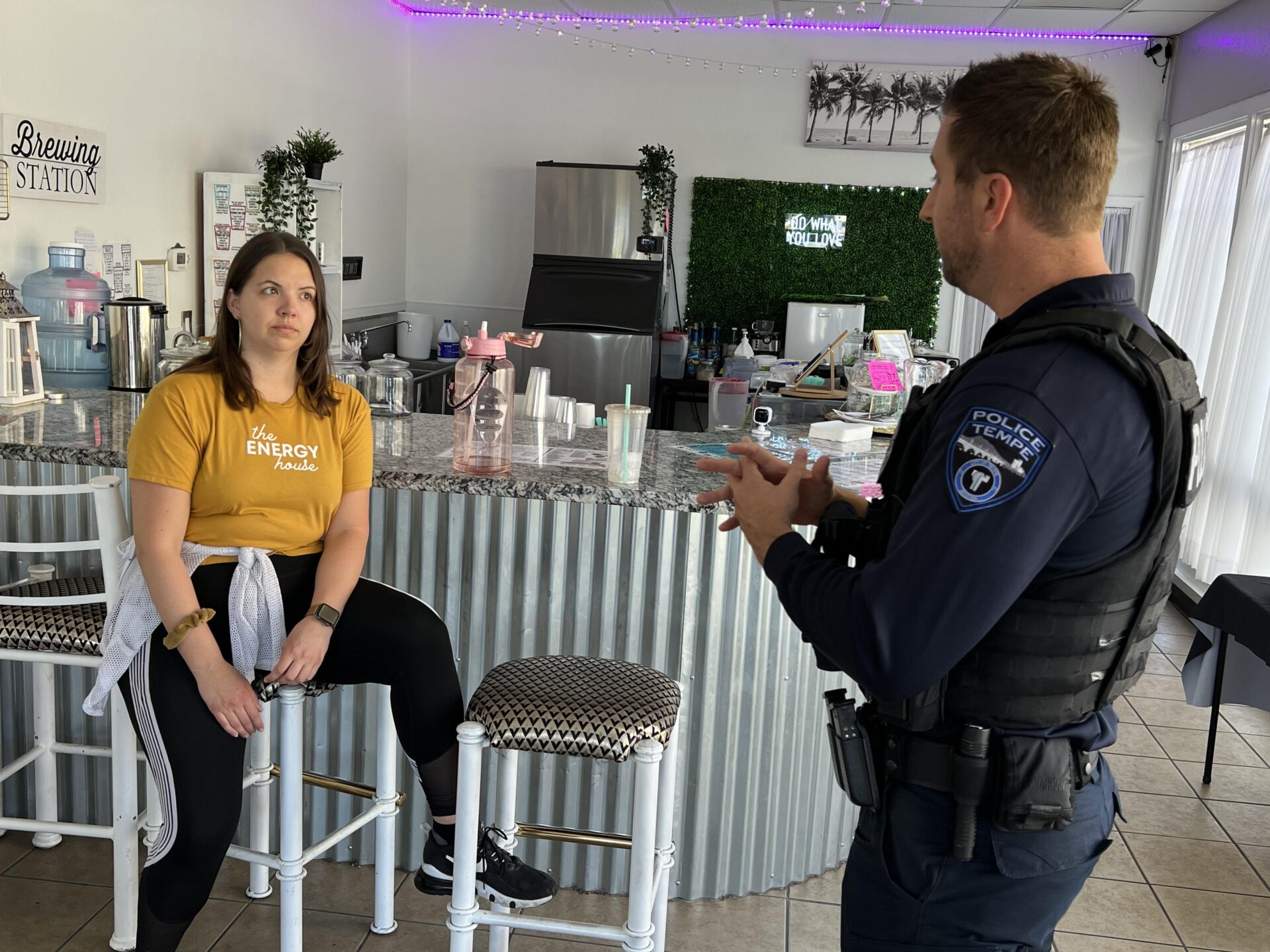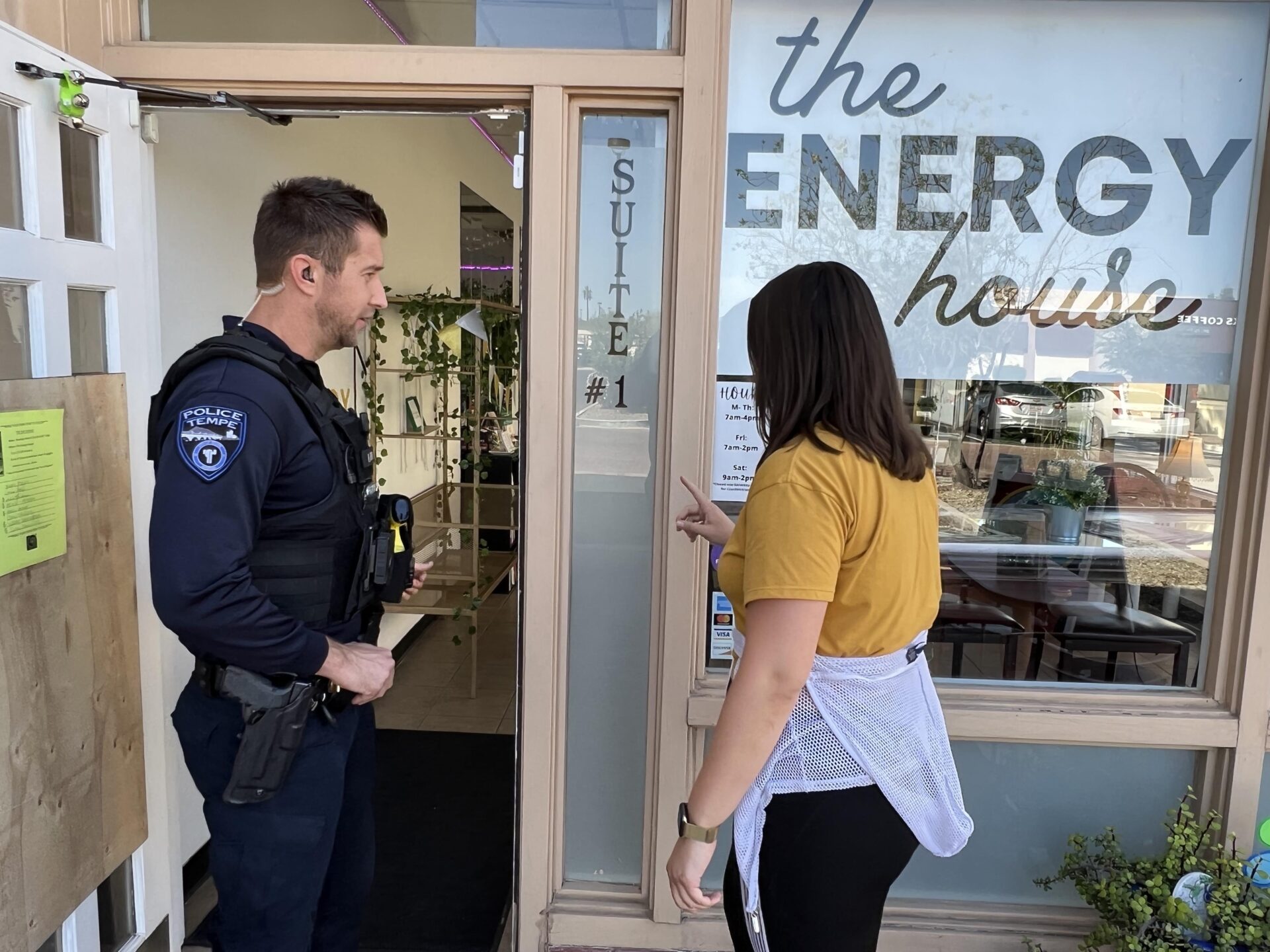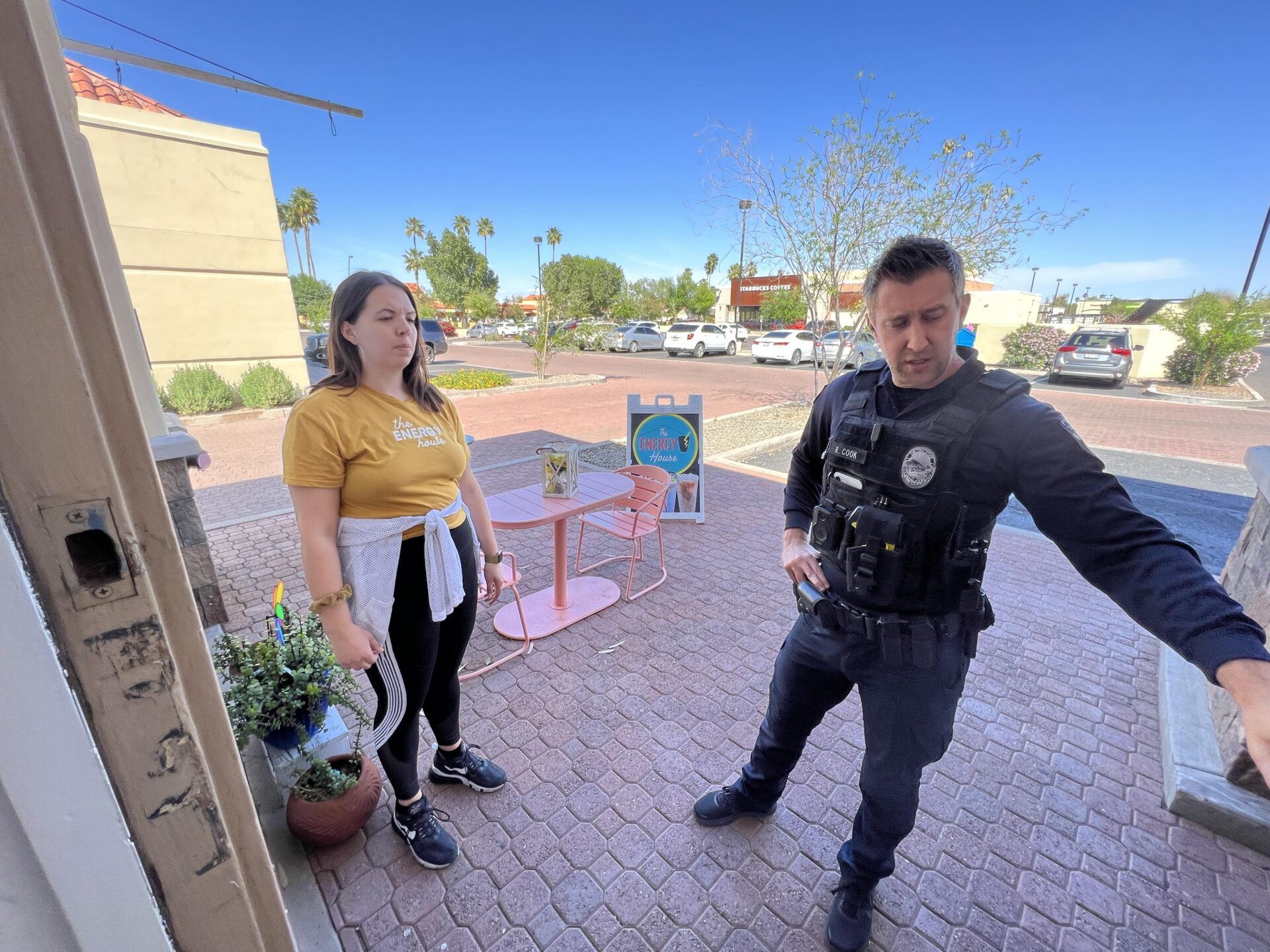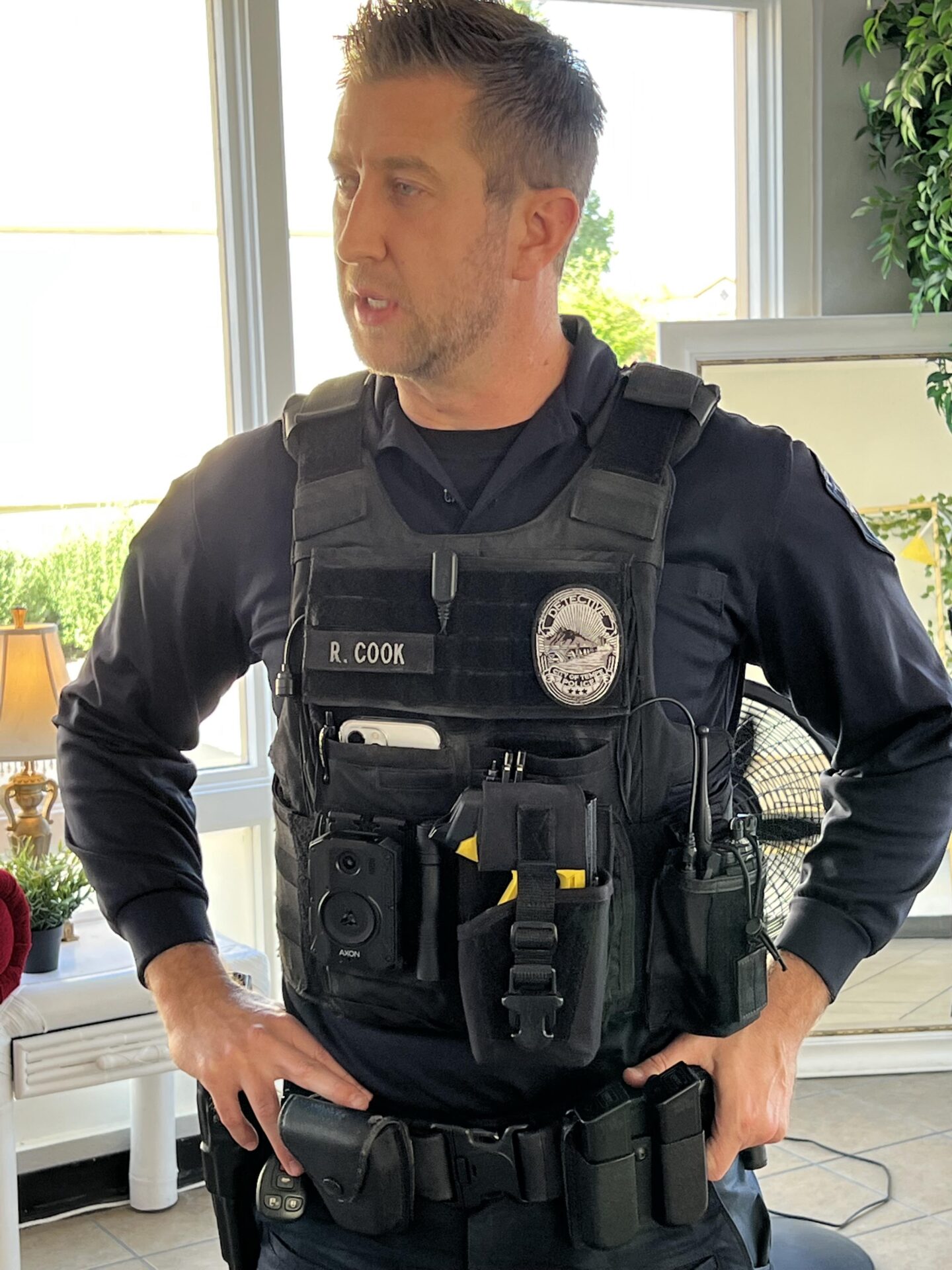
It can be as simple as a business owner forgetting to lock the back door at night. Or perhaps the front door has glass panels and isn’t all that sturdy, making it the perfect target for a break-in.
Tempe Police Detective Ryan Cook says that several recent crimes against South Tempe businesses likely were preventable.
“Just take a minute to secure your business at the end of the day. It’s often just that simple,” Cook said.
The Peppermill and the Word of Mouth Grill, both in the strip center at 7660 S. McClintock Drive, at Elliot Road, have experienced recent break-ins.
So has The Energy House, a mile south at 1721 E. Warner Road at McClintock – for the third time in the 2½ years that Karly Olson, 30, has owned the energy-nutrition bar that serves meal-replacement shakes, green teas, energy drinks and boasts a full protein coffee bar.

Olson said that in conversations she has had with other small-business owners in the area and across Interstate 10 in Ahwatukee, break-ins – in some cases smash-and-grabs – seem to be a trend. Olson says that surveillance videos suggest that it could be the same person.
Law-enforcement officials aren’t ready to confirm that. In fact, Cook said, the crimes aren’t necessarily even directed at small businesses.
“They’re crimes of opportunity,” said Cook, a member of the department’s Chief’s Office of Community Policing – formerly the Tempe Crime Prevention Unit.
Olson’s Energy House break-in was through the front door, where glass panels were broken out and the burglar then reached inside to open the door.
“I came in the next morning through the back door,” Olson said. “As I walked up, I noticed that it was slightly open. My heart just dropped. I thought, ‘Oh, my gosh, I’m the one of who closed yesterday, I can never see myself not locking this door.’
“As I walked up to the front, three little windows in the front door were broken out.”
Olson said the burglar took only the cash box, which had less than $100 in it.

“They just took the cash. They left iPads, they left the tip jar,” she said. “They obviously wanted to get in and out fast, and they went out through the back door.
“This seems to be a common theme as I talk to owners. They grab the cash box, they leave anything that can be traceable like an iPad, they grab one thing and they’re out the back door.”
Cook, who has been with the department for nine years, said there was a similar string of crimes just north of U.S. 60 before the COVID-19 pandemic. Through community outreach from police and cooperation from business owners, the streak was stamped out.
“I work with these small-business owners all the time just to do outreach and make contact with them,” Cook said. “At Peppermill and Word of Mouth, I know both owners very well. The Peppermill incident was not a smash-and-grab. An employee had left the back door unlocked overnight.
“I watched the video surveillance of the Peppermill incident. The gentleman who was there was exhibiting very unusual behavior. I don’t know if it was led by a mental-health situation or possibly drug inducted. He finally just pulled the door handle and it opened, and he went inside. He didn’t take Apple laptops or expensive bottles of alcohol. He didn’t even take cash. He took like the weirdest, smallest items.”
Cook has several security suggestions for business owners, especially small-business owners. Generally, he says, crimes of opportunity against small businesses come down to securing the property outside the building.

“If there’s a patio or seating outside, like at Word of Mouth, it may be a pain to bring it in at the end of the night or cabling it down outside but it helps keep unwanted people away in the middle of the night,” he said.
Cook also recommends monitoring the property, with the owner’s own camera system or by hiring a monitoring company.
If Wi-Fi is offered, he says that closed networks are best.
“So at night, those simply looking to find an open Wi-Fi don’t come to the location,” he said. “Secure all exterior outlets, as well. It can bring in unwanted traffic at night if there’s free Wi-Fi and electricity.”
A laminate on windows, so it’s difficult to see in but easy to see out in order to maintain vigilance, is good, according to Cook.
Inside the building, Cook says that motion-detection systems are a good call. Cameras, placed in opposite corners of the facility to get a crisscross view, also are helpful.
And, he adds, “never, never, never leave cash in the register. At the end of the night, secure it somewhere, like in a vault, but never leave it in the register. That’s the first line of attack: They go straight for the register.”
Among Cook’s duties is performing security assessments of business, both existing and those planned and under construction. Tempe Police Department, he says, is big on crime prevention through environmental design.
As he walked through Olson’s Energy House, he noted that it was easy and relatively quiet for the front-door panels to be broken out to gain entry.
“A rock in a sock,” he said. “It breaks inward. It’s quiet.”
Olson said it would cost about $300 to replace the broken glass panels, but closer to $1,000 to replace the front door with one of a more secure design. For a small business, that’s a lot of money. Her insurance is $500 deductible, she says, but payable only if the loss is greater than $5,000, which hers isn’t.

Cook encourages businesses to do what Olson and others are doing: network and share information.
“In the string of break-ins before COVID, we had an officer in our unit do a business alliance. The hotels, convenience stores and apartment complexes in the area got together with him and they talked. What are you seeing? Have you seen this person? Any unusual or suspicious behavior?” Cook said.
Olson, for the third time, will eat the repair cost of the break-in and the loss of the cash.
“It’s kind of tough,” she said. “It happens so fast. They grab the cashbox and they’re gone. All of these people have alarms and camera systems but it’s like so quick that those things don’t even make a difference. Our Police Department can only go so fast.
“But we can educate people that this is a theme and we all need to be watching this stuff and calling it in.”

